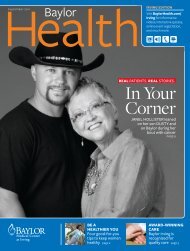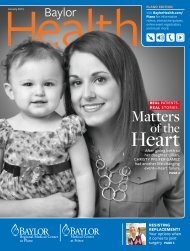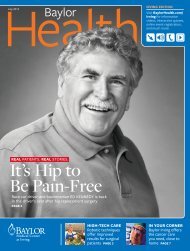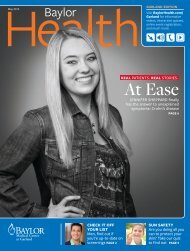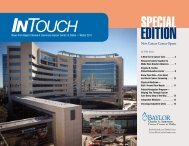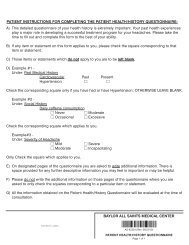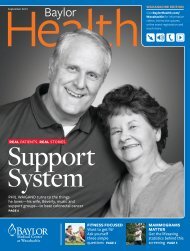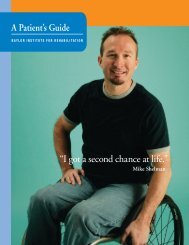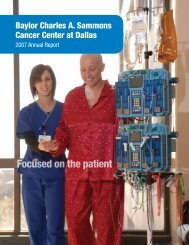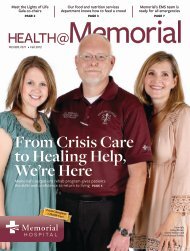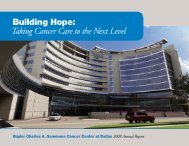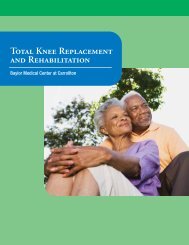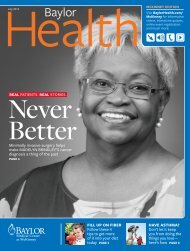Saints Fort Worth - Baylor Online Newsroom - Baylor Health Care ...
Saints Fort Worth - Baylor Online Newsroom - Baylor Health Care ...
Saints Fort Worth - Baylor Online Newsroom - Baylor Health Care ...
- No tags were found...
You also want an ePaper? Increase the reach of your titles
YUMPU automatically turns print PDFs into web optimized ePapers that Google loves.
<strong>Health</strong><strong>Baylor</strong>May 2012<strong>Health</strong>and muchFORT WORTH EDITIONVisit <strong>Baylor</strong><strong>Health</strong>.com/All<strong>Saints</strong> for informativevideos, interactive quizzes,online event registrationmore.REAL PATIENTS. REAL STORIES.Man Upfor Your <strong>Health</strong>Men are notorious for avoiding the doctor.But WAYNE REYNOLDS is alive today becausehe sought treatment when he needed toPAGE 4Wayne is picturedwith his wife, Martha.HEADACHEHELPGet relief atthe HeadacheCenter PAGE 2IS GLUTEN-FREEFOR YOU?Find out if you havethe symptoms ofceliac disease PAGE 7
Stop the ThrobbingHeadache Center’s expanded services mean you can finally find reliefFOR MOST OF US, headaches areperiodic annoyances. We pop anaspirin, lie down and, sooner orlater, the pain passes and we goabout our business. But for some,headaches are excruciating,relentless and debilitating. Andeven after seeing a doctor, theystill can’t find relief.“The majority of our patientshave migraines of some fashion,”says Frederick Freitag, D.O., aphysician on the medical staff at<strong>Baylor</strong> All <strong>Saints</strong> Medical Centerat <strong>Fort</strong> <strong>Worth</strong> who specializes inheadache medicine. “They havechronic migraines at least half ofthe days of a month.”<strong>Fort</strong>unately for these patients,the Headache Center at <strong>Baylor</strong><strong>Fort</strong> <strong>Worth</strong> has expanded itsservices and is now seeingpatients three days a week.WHO BENEFITSFROM THE CENTERMost patients with headaches canbe treated by their primary carephysician. But when that’s notenough, the Headache Center can help.“Maybe they’ve been seeing theirdoctor for a while and still havefrequent and debilitating headacheattacks,” Dr. Freitag says. “Or maybethey’ve had emergency room visits orhospitalizations because of headaches.”At the Center, physicians can helpyou find the best course of treatment,whether it’s helping you avoidheadache triggers, or prescribingoral or IV medication.WHAT TO BRINGPatients usually are referred to theHeadache Center by their physician,but they also can self-refer. For yourfirst appointment, bring a list of themedications you’ve tried to manage your25-55The age range inwhich migraines aremost common.Do You Have Chronic Headaches?To make an appointment at the Headache Center at <strong>Baylor</strong> <strong>Fort</strong> <strong>Worth</strong>, call 1.800.4BAYLORor visit <strong>Baylor</strong><strong>Health</strong>.com/All<strong>Saints</strong>Headache today.headaches, as well as the results to anydiagnostic tests you’ve had done.“Unfortunately, when you haveheadaches very frequently, painmedications and specific treatments tostop them can actually lead to more andmore headaches,” Dr. Freitag says. “Wework closely with the pain managementprogram at <strong>Baylor</strong> <strong>Fort</strong> <strong>Worth</strong> to get youthe help you need.”<strong>Baylor</strong> All <strong>Saints</strong> Medical Center at <strong>Fort</strong> <strong>Worth</strong>, 1400 Eighth Ave., <strong>Fort</strong> <strong>Worth</strong>, TX 76104, 817.926.2544. Visit <strong>Baylor</strong><strong>Health</strong>.com or call 1.800.4BAYLOR for information about <strong>Baylor</strong> All <strong>Saints</strong> Medical Center services,upcoming events, physician referrals, career opportunities and more. Marketing/Public Relations Director: Audrianne Schneider, FACHE.<strong>Baylor</strong> <strong>Health</strong> <strong>Care</strong> System Mission: Founded as a Christian ministry of healing, <strong>Baylor</strong> <strong>Health</strong> <strong>Care</strong> System exists to serve all people through exemplary health care, education, research and community service.All <strong>Saints</strong> Outpatient Diagnostic Center: 817.922.7780. All <strong>Saints</strong> <strong>Health</strong> Foundation: 817.922.7707. Behavioral <strong>Health</strong> Services: 817.922.1162. Carter Rehabilitation & Fitness Center: 817.922.1139. Diabetes Center:817.922.1794. Lymphedema Center: 817.922.2530. Neuroscience Program: 817.922.2385. Pain Management Program: 817.922.PAIN. Transplantation Services: 817.922.4650. Volunteer Services: 817.922.2376. WoundManagement Program: 817.922.2430.The material in <strong>Baylor</strong><strong>Health</strong> is not intended for diagnosing or prescribing. Consult your physician before under taking any form of medical treatment or adopting any exercise program or dietary guidelines.Physicians are members of the medical staff at one of <strong>Baylor</strong> <strong>Health</strong> <strong>Care</strong> System’s subsidiary, community or affiliated medical centers and are neither employees nor agents of those medical centers, <strong>Baylor</strong> All<strong>Saints</strong> Medical Center or <strong>Baylor</strong> <strong>Health</strong> <strong>Care</strong> System. <strong>Baylor</strong><strong>Health</strong> is published six times a year for friends and supporters of <strong>Baylor</strong> All <strong>Saints</strong> Medical Center and is distributedby the Marketing Department of <strong>Baylor</strong> All <strong>Saints</strong> Medical Center. <strong>Baylor</strong><strong>Health</strong> is published by McMurry. © 2012 <strong>Baylor</strong> <strong>Health</strong> <strong>Care</strong> System. Photographs may include modelsor actors and may not represent actual patients. If you are receiving multiple copies, need to change your mailing address or do not wish to receive this publication, please sendyour mailing label(s) and the updated information to Robin Vogel, <strong>Baylor</strong> <strong>Health</strong> <strong>Care</strong> System, 2001 Bryan St., Suite 750, Dallas, TX 75201, or by email to robinv@baylorhealth.edu.2 <strong>Baylor</strong><strong>Health</strong>.com ©Blend Images/Photoshot
Think YouAren’t at Risk?It’s true that Caucasiansand those with fair skinare at the highest riskfor skin cancer. But thatdoesn’t mean peopleof other ethnicities andskin types don’t have toworry. Mortality ratesare disproportionatelyhigh in non-Caucasians.No matter your skincolor, see your doctorif you notice a newor existing mole thathas irregular borders, isasymmetrical, changescolor or is larger indiameter than apencil eraser.SUN SAFETYSeven tips for preventing skin cancer year-roundIT’S HAPPENED to all of us atone time or another—usuallythe first day of vacation.You underestimate the sun’sstrength or you forget toreapply your sunscreen.However it happened, thenext day you are sorry.The stinging, the pain, thatinhuman shade of red. Finally,you recover (after you getback home, of course),but did you know that thedamage of one sunburn canstick with you?“The risk for skin cancerstarts the moment you’reexposed to sun, and it hasa cumulative effect,” saysPrasanthi Ganesa, M.D.,a medical oncologist onthe medical staff at <strong>Baylor</strong>All <strong>Saints</strong> Medical Centerat <strong>Fort</strong> <strong>Worth</strong>. “The moreyears you’re exposed, themore prone you are togetting skin cancer.”No matter what type ofdamage you may have done inthe past, you can still preventmore from occurring withthese tips:1. Stay in the shade.Especially during thehours of 10 a.m. and4 p.m. when the sunis at its strongest.2. Cover up.Wear lightweightlong-sleeve shirtsand pants in the sun. Anddon’t forget a wide-brimmedhat and sunglasses. “Theskin around the eye is verysensitive. And skin cancer canhappen in or behind the eye,too,” Dr. Ganesa says. “Usedark shades with good UVprotection.”3. Slather it on. Choosewater-resistant sunscreenwith an SPF of 30 or higherand apply two tablespoonsover the entire body (evenyour ears and hairline)30 minutes before goingoutside.4. Slather it on,again. Reapply sunscreenevery two hours.Get ItCheckedTo learn more abouthow to protect yourselffrom sun damage orfor more informationon skin cancer, call1.800.4BAYLOR or visit<strong>Baylor</strong><strong>Health</strong>.com/All<strong>Saints</strong>Cancer.5. Don’t use artificialtanning beds. “Even thenewer technologies aren’tsafe,” Dr. Ganesa says.6. Get checked. Inspectyour skin every month, andsee your doctor once a yearfor a clinical exam.7. Cover up your kids.Even one bad sunburn inchildhood can double aperson’s chance of melanomalater in life, according toThe Skin Cancer Foundation.Newborns should be keptout of the sun at all times.©Getty Images/Goodshoot RF<strong>Baylor</strong><strong>Health</strong>.com 3
REAL PATIENTS. REAL STORIES.Live Longer,Live StrongerSSmart Smart strategies to defusemen’s top health threats35, Reynolds had several colonoscopies in his30s and 40s before getting an all-clear reportwhen he was 48. Later, when bleeding croppedStaying in shape is a priority for Wayne Reynolds. “I’ve alwaysbeen extremely health conscious,” says the 55-year-old banksenior vice president. Because of bleeding polyps when he wasup again, internal hemorrhoids were diagnosed.But Reynolds felt that it wasn’t a big enoughdeal to want to take time away from his busywork and family life.When Reynolds finally scheduled repair surgery in 2010,the surgeon discovered Reynolds also had a tumor in hiscolon. It took almost a year of chemotherapy, radiationand surgery to treat the stage-three cancer.“If I had acted sooner, I might havebeen diagnosed with stage-one coloncancer,” Reynolds says. “It’s bestto err on the side of currentinconvenience instead oflong-term inconvenience.”Although he still struggleswith chemo-induced peripheralneuropathy, making it difficult tofeel his feet and be as active as hewould like, today Reynolds’ canceris gone and he is relieved.Watch Wayne’s StoryTo hear more about Wayne’s story, visit<strong>Baylor</strong><strong>Health</strong>.com/<strong>Health</strong>cast today.Wayne Reynoldssurvived colon cancer,thanks to his goodsense to see a doctorwhen he did andthe support ofhis wife, Martha.4 To download a tipsheet about men’s health at midlife, visit <strong>Baylor</strong><strong>Health</strong>.com/<strong>Health</strong>cast
Like Reynolds, you may think you’re too busy for an annual physical, screeningtest or minor medical procedure. But “sacrificing an hour or an afternoon oreven two or three days of your life is a lot more efficient than sacrificing weeksand months of your life” for treating more-advanced disease, Reynolds says.Here’s what you can do to guard against common diseases that strike men:THREAT:CARDIOVASCULAR DISEASEStrategy: Get your numbers in line“The number-one killer of men iscardiovascular disease,” says ShaunMcMurtry, M.D., a family medicinephysician on the medical staff at<strong>Baylor</strong> Regional Medical Centerat Grapevine. When fatty plaquedeposits build up in blood vessels,they can cause heart attack or stroke.Just like tracking business goals,you can’t measure your progressif you don’t know your numbers.Keep an eye on your blood pressure,cholesterol and weight.“Generally speaking, you’re notgoing to feel bad from high bloodpressure or cholesterol,” Dr. McMurtrysays. “So you don’t know you havethem until you get the screening done.”Improving your diet and exercisehabits can help modify weight andcholesterol and blood pressure levels.If lifestyle changes aren’t enough,medication may help reduce yourheart disease risk.THREAT: CANCERStrategy: Talk to your doctor aboutnecessary screeningsLung, prostate and colon cancerare the top three cancers in men.“Screening is the biggest way to catchcolon cancer in its early stages,”Dr. McMurtry explains. “Anytimeyou can catch a cancer early, before itspreads, you have a better outcome.”If everyone older than 50 would getrecommended screening tests, coloncancer deaths could be reduced by asmuch as 60 percent, the Centers forDisease Control and Prevention says.“It’s important to have regularvisits with your primary care doctorso you know if you need to screenearlier,” Dr. McMurtrysays. You can also discussthe risks and benefits ofscreening for prostate cancer by meansof a digital rectal exam or prostatespecificantigen testing.Smoking is the culprit for about90 percent of lung cancer deaths inmen. “If you don’t smoke, don’t start,”Dr. McMurtry says. “If you do, quit.”See your doctor if you experiencesymptoms such as chest pain,chronic cough, coughing up bloodor unexplained weight loss.THREAT: DIABETESStrategy: Be physically activeand lose a little bit of weightBeing overweight and inactive are twomajor risk factors for type 2 diabetes.“Losing weight and exercising havebeen proven to decrease your risk ofdeveloping diabetes,” Dr. McMurtrysays. Losing just 5 to 7 percentof your body weight can delay orprevent diabetes, according to aNational Institutes of <strong>Health</strong> study.Even without weight loss, exercisecan help lower blood sugar, otherresearch has shown.“Diabetes affects every systemin the body,” Dr. McMurtry says.Uncontrolled high blood sugar putsyou at risk for heart disease, stroke,vision loss, kidney disease, erectiledysfunction, and nerve damage thatcauses a loss of feeling in the feetand legs.It can be hard to make time foryour health in the midst of work andfamily responsibilities, Reynoldsacknowledges. “But if I’m gone, Ican’t take care of my family. Yourphysical health is more importantthan anything else.”Acting now can preserve your abilityto enjoy life in the future. “You needto catch these health conditions intheir early stages,” Dr. McMurtry says,“so you can prevent complicationsas you get older that can limit yourability to be active.”An Event Justfor You, Guys!For men who dislike going tomultiple doctors’ appointments,foregoing those all-importantregular health screenings, the It’s aGuy Thing event in June is just foryou. It’s one-stop health shopping.So mark your calendar.It’s a Guy ThingDate: Saturday, June 23Time: 7:30 a.m. to noonLocation: Martin Tower Atriumat <strong>Baylor</strong> All <strong>Saints</strong> Medical Centerat <strong>Fort</strong> <strong>Worth</strong>, 1400 Eighth Ave.,<strong>Fort</strong> <strong>Worth</strong>, TX 76104Visit the various booths to learnabout men’s health issues, includingcardiology, depression, diabetes,sleep apnea, smoking cessation,sports medicine and weightmanagement. And don’t miss outon these convenient screenings:• Glucose and cholesterol(Fasting is required forscreening results. You maytake your regular medicationsas directed.)• Blood pressure• Body mass index (BMI)calculations• And more!The event is free, but registration isrequired. Call 1.800.4BAYLOR orvisit <strong>Baylor</strong><strong>Health</strong>.com/GuyThingto learn more and to register.©Jupiter Images<strong>Baylor</strong><strong>Health</strong>.com 5
33.5%More than a thirdof U.S. adults havehigh blood pressure.Easing the Pressure<strong>Baylor</strong> study investigates alternative to blood pressure medicationUNCONTROLLED HIGH BLOODPRESSURE can lead to serious healthissues, including heart disease, kidneydisease and stroke. <strong>Baylor</strong> researchersare studying a new approach thatcould help normalize blood pressure—without medication.The Symplicity trial is testing aminimally invasive procedure knownas renal denervation. The experimentalprocedure uses heat that is generatedby radio frequency to disrupt nervecommunication to and from the kidneys.This can reduce overactivity in thesympathetic nervous system, a frequentcause of chronic high blood pressure.“The sympathetic nervous systemcontrols blood pressure and cancause hypertension initiated by lifeand stress,” says David L. Brown,M.D., principal investigator at THEHEART HOSPITAL <strong>Baylor</strong> Plano.“This investigational device is beingtested to determine if it will disruptthe sympathetic nervous system,which may significantly lower bloodpressure, stop multiple antihypertensivemedications, and have an effect on otherconditions affected by the sympatheticnervous system.”Blood pressure is measured inmillimeters of mercury (mmHg). Lessthan 120/80 is considered healthy. Toenroll in the Symplicity trial, patientsmust have a blood pressure level in whichthe top (systolic) number is above 160.They must also be taking the maximumdose of three to five different bloodpressure medications simultaneouslyDo You Have HighBlood Pressure?To enroll in the Symplicity trial,visit <strong>Baylor</strong><strong>Health</strong>.com/AdvancingMedicine.but not achieving the desiredlower blood pressure levels.“In previous studies of thisdevice in limited numbers ofpeople, this simple procedurereduced patients’ bloodpressure by an average ofabout 30 mmHg, a reductionthat persisted throughoutsubsequent assessments,”says Sonia Prashar, M.S.,CCRC, research coordinatorat THE HEART HOSPITAL<strong>Baylor</strong> Plano. <strong>Baylor</strong> Jackand Jane Hamilton Heartand Vascular Hospital also isparticipating in the study.Participants will berandomly assigned intotwo groups: One group willhave the renal denervationprocedure and the other group will not.(No one but the surgical team will knowwho is in each group.) Patients will begiven home blood pressure monitors andfollowed up with frequently. After sixmonths, participants who did not havethe procedure may be given the optionof having it done, if they still qualify.If the study confirms that renaldenervation can result in a large,persistent decrease in blood pressure, itcould be excellent news for people whohave high blood pressure that isn’t beingsuccessfully controlled with medication.“Improving blood pressure hasa profound effect on longevity andreducing the risk of stroke,” says JamesW. Choi, M.D., primary investigator forthe Symplicity trial at <strong>Baylor</strong> HamiltonHeart and Vascular Hospital. “Catheterbasedrenal denervation is an exciting,investigational treatment for patientswith resistant hypertension whootherwise might not be able to be helped.”6 <strong>Baylor</strong><strong>Health</strong>.com
SHOULD YOU GO GLUTEN-FREEHow to recognize the markers of celiac diseaseYOU’VE PROBABLY SEEN the specialsection in the grocery store or themenu items labeled “gluten-free.” Itseems to be a growing trend. But it’snot the newest way to lose weight.Gluten-free foods reduce the painful,embarrassing and harmful symptomsof celiac disease.“Celiac disease is essentially a dietaryintolerance to gluten, which is a wheattypeproduct,” says Josh George, M.D.,a gastroenterologist on the medicalstaff at <strong>Baylor</strong> All<strong>Saints</strong> Medical Centerat <strong>Fort</strong> <strong>Worth</strong>. “Theytend to have issueswith inflammation[swelling] in thelining of the smallintestine. Symptomsinclude diarrhea andmalabsorption. Butothers are abdominalpain, bloating,iron deficiency,osteoporosis and fertility issues.”97%The percentageof people withceliac disease whogo undiagnosed.GET DIAGNOSEDCeliac disease is a lifelongautoimmune disease often diagnosedbetween the ages of 20 and 40, but itcan show up in children, too. One signin kids is improper development. Ifyou think you may have celiac disease,it’s important to get diagnosed so itcan be properly treated.“Go to your physician so he or shecan take a good history,” Dr. Georgesays. “Get an idea of what seems to bebringing on your symptoms.” Keepinga food diary can help with that. Ablood test or endoscopy, or both, areused to confirm the diagnosis.WATCH WHAT YOU EATHow is celiac disease treated? It’s prettysimple. “Avoid gluten,” Dr. Georgesays. “It’s used in a lot of products, likebread, cereal and pasta, but you canfind substitutes. And it’ll really boostyour quality of life.”When shopping, avoid foods withthe following ingredients, advises theCeliac Disease Foundation:• Barley• Rye• Triticale (a wheat-rye hybrid)• Wheat (also durum, graham,khorasan, semolina, spelt)• Malt, malt flavoring, malt vinegarBut food isn’t the only culprit.Medications and nutritionalsupplements can also contain gluten.“Oftentimes, we’ll get a nutritionistor dietitian involved to teach patientshow to read food and product labels,”Dr. George says. “The good news isthat once they follow the diet, theirsymptoms should clear up.”Find Out if YouHave Celiac DiseaseTo learn more about celiac disease orfor a referral to a gastroenterologiston the medical staff at <strong>Baylor</strong><strong>Fort</strong> <strong>Worth</strong>, call 1.800.4BAYLORor visit <strong>Baylor</strong><strong>Health</strong>.com/All<strong>Saints</strong>Digestive.Woman with bread: ©Getty Images; doctor: ©Blend Images/Photoshot<strong>Baylor</strong><strong>Health</strong>.com 7
<strong>Baylor</strong> All <strong>Saints</strong> Medical CenterP.O. Box 31<strong>Fort</strong> <strong>Worth</strong>, TX 76101NON-PROFIT ORG.US POSTAGEPAIDBAYLOR HEALTH



